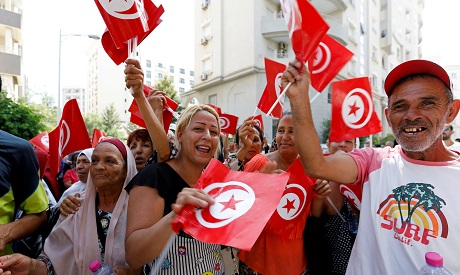
Supporters react after Tunisian Prime Minister Youssef Chahed submitted his candidacy for the presidential elections, in Tunis, Tunisia August 9, 2019 (Photo: Reuters)
Following the death of Tunisia’s former president Beji Caid Essebsi, the country’s 2019 presidential elections have been brought forward and are now set to take place on 15 September.
Seventy-one out of the nearly 100 candidates were rejected, while the remaining 26 were approved by the Tunisian Electoral Commission.
Among the candidates is lawyer Abdel-Fattah Mourou, co-founder and vice-president of the Islamist Ennahda Party. After receiving 157 votes from a possible 214, Mourou was also made the first vice-president of Tunisia’s parliament.
The 71-year-old was nominated by Ennahda to submit his candidacy for the 2019 presidential elections, making him its first-ever contender to run for president since the movement was recognised 38 years ago. Mourou is known to be an Ennahda moderate and is one of Tunisia’s most prominent political figures.
According to Tunisian political analyst Mohamed Dhia Hammami, Mourou is a “clever choice… [as] his popularity goes beyond the traditional base of Ennahda. If he gets to the second round, his chances of becoming president are very significant.”
The trilingual nominee is distinctive among the rest of the candidates not only because he speaks German alongside Arabic and French, but also because of his choice of wardrobe. He prefers to wear the traditional Tunisian attire of the “jebba” and “chechia” hat rather than Western-style suits.
Prime Minister Youssef Chahed also submitted his candidacy after being nominated by the liberal Long Live Tunisia Party. The 43-year-old is Tunisia’s 23rd prime minister and an agricultural engineer by profession who has taught agricultural economics in several countries.
Chahed was previously secretary of state for fisheries from 2015 to 2016 and became minister of local affairs in 2016. He was a member of Nidaa Tounes, the party of former president Essebsi, before forming his secular party Long Live Tunisia in 2019, currently the country’s second-largest party.
Also running for president is Tunisia’s current Minister of Defence Abdel-Karim Zbidi. The 69-year-old was a close ally of former president Essebsi, and although supported by Nidaa Tounes he is running as an independent in the presidential elections.
Before becoming a political figure, Zbidi gained a degree in human biology and a doctorate in medicine. His academic history and choice of career make him stand out from the rest of the candidates and may also make him the most serious rival to Chahed.
Former interim president Mohamed Moncef Marzouki is another candidate in the forthcoming presidential elections. He was Tunisia’s first president after the overthrow of former president Zein Al-Abidine Ben Ali in the 2011 Revolution before being succeeded by Essebsi.
The 74-year-old is the long-term leader of the centre-left party the Congress for the Republic (CPR), and he has been a human-rights activist and a member of the Constituent Assembly responsible for developing a new constitution after the revolution.
Tunisian businessman Nabil Karoui, owner of the Nesma TV channel, is also a candidate in the elections. He was a founding member of Nidaa Tounes and was almost disqualified from standing in the forthcoming elections owing to an amendment to the electoral law that did not come into effect before Essebsi died.
The Bizerte-born tycoon is facing prosecution on charges of money laundering and tax-evasion alongside his brother Ghazi Karoui. The opinion polls show that he is well situated with respect to the forthcoming elections despite the charges against him.
Businessman Slim Riahi has also joined the electoral race despite the possibility of arrest if he sets foot in Tunisia. Riahi submitted his candidature from abroad after a Tunisian court found him guilty of corruption. He was a founder of the Free Patriotic Union Party and then secretary-general of Nidaa Tounes.
Abir Moussi is one of the two female candidates for the presidency, the other being Nidaa Tounes’s Selma Elloumi. Forty-four-year-old Moussi is a lawyer by profession and is currently president of the Free Destourian Party (PDL) that aligns itself with the ideas of former president Habib Bourguiba.
MP Mongi Rahoui was the first contender to put forward his candidacy in the elections. He is supported by the Al-Watad and Al-Taliaa Parties, both of which are left-wing. Before becoming involved in politics, Rahoui worked for Tunisia’s National Agricultural Bank and then went on to become a political and union activist as well as a member of the Constituent Assembly.
According to Tunisian commentator Fethi Riahi, the majority of Tunisians are politically involved even if they may not be aware of the intricacies of the voting system.
“Many Tunisians may want to vote for Abdel-Fattah Mourou because they see him as a person like them that they can relate to. He dresses like them and even talks like them,” Riahi said. “They don’t see him as an extremist in term of his Islamist ideology,” he added.
The upcoming elections are the second time Tunisia has held elections since the 2011 Revolution, and they are being held earlier than planned. After the voting closes on 15 September, preliminary results are set to be announced on 17 September.
*A version of this article appears in print in the 20 August, 2019 edition of Al-Ahram Weekly under the headline: Tunisia’s election contenders
Short link: